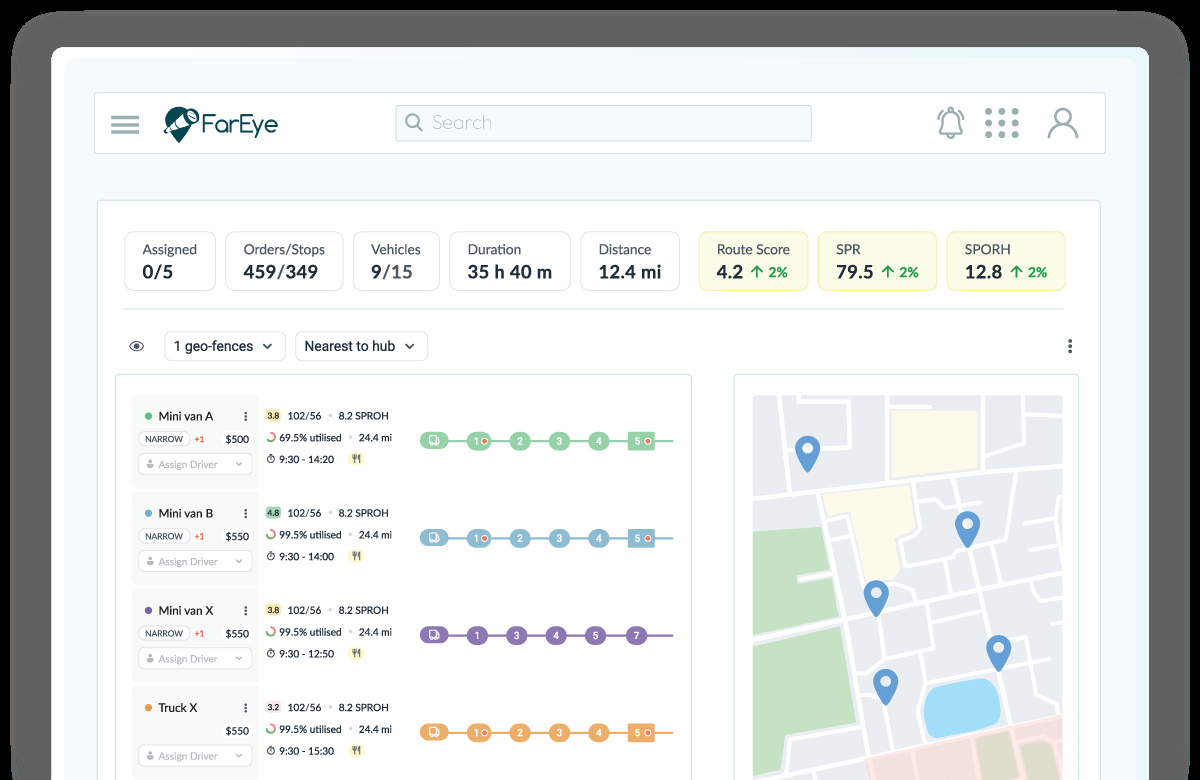- Route Optimization
Multi Route Planner Solutions: Managing Large-Scale Routes with Ease
Table of Contents

Efficient route planning has become a cornerstone for industries like e-commerce, logistics, and freight, where large-scale operations and timely deliveries are essential. In fact, logistics costs now account for nearly 11% of global GDP, with inefficiencies in routing contributing significantly to the rising expenses.
As customer expectations evolve and supply chains grow more complex, businesses are increasingly adopting multi-route optimization strategies to enhance operational efficiency. These solutions not only address the challenges of last-mile delivery but also streamline large-scale, multi-stop routing, enabling cost-effective and timely operations across diverse industries.

Let’s explore actionable insights and proven technologies to help businesses master large-scale route management with ease.
The Challenges of Managing Large-Scale Routes
Managing large-scale routes comes with significant challenges that can impact operational efficiency, compliance, and cost-effectiveness. Understanding these hurdles is the first step towards implementing effective solutions.
Complexity of Multi-Stop Routes
Coordinating multi-stop routes involves managing diverse variables like time windows, driver shifts, road restrictions, and geographical dispersion. The challenge grows with increasing route density, making manual planning unsustainable for large-scale operations. For instance, optimizing time-sensitive deliveries across urban areas with traffic restrictions requires precision that traditional methods cannot guarantee.
Compliance and Regulation Issues
Adhering to Department of Transportation (DoT) regulations, driver work-hour limits, and state-specific laws are non-negotiable. Violations can result in costly penalties, operational delays, or unsafe working conditions. For example, exceeding federal Hours-of-Service (HoS) limits often triggers hefty fines and jeopardizes driver safety, emphasizing the need for automated compliance tracking.
Cost Overruns and Inefficiencies
Inefficient routing directly impacts costs, from increased fuel consumption to overtime pay and underutilized vehicle capacity. Studies show that poor route planning can inflate logistics costs. Additionally, inefficiencies can lower customer satisfaction as delays ripple through the supply chain, reducing competitiveness in the market.
Key Features of a Multi Route Planner Solution
A robust multi-route planner solution is equipped with features that streamline large-scale logistics, ensuring efficiency and compliance. Let’s explore the key functionalities that make these solutions indispensable.
Intelligent Route Optimization
Modern multi-stop route planners use advanced algorithms to determine the most efficient delivery paths. It factors in co-mingling loads and optimizing vehicle capacities to reduce operational costs. By maximizing load utilization, businesses achieve better delivery efficiency and minimize empty miles.
Dynamic Re-Routing & Real-Time Adjustments
Dynamic rerouting leverages real-time data to adapt to traffic, weather, or unexpected delays. For example, live GPS tracking can suggest alternate paths, minimizing disruptions and ensuring on-time deliveries. Such flexibility empowers businesses to stay agile, even under challenging conditions.
Integration with Other Business Systems
Multi-route planners integrate seamlessly with fleet management, warehouse, and customer order systems. This interconnected approach ensures efficient vehicle dispatch, synchronized inventory movement, and enhanced visibility across the supply chain. For instance, integrated systems can trigger automatic updates for customers, improving satisfaction.
Compliance Features
Built-in compliance tools ensure adherence to Department of Transportation regulations, state laws, and driver working hour limits. These features help avoid legal penalties, maintain driver safety, and streamline operations by ensuring routes comply with load restrictions and road rules.
Each feature contributes significantly to addressing the challenges of large-scale routing, enabling businesses to achieve operational excellence.
The Benefits of Multi Route Planner Solutions
Multi-route planner solutions bring measurable advantages to logistics operations, transforming efficiency, cost management, and customer satisfaction. Here are the key benefits they offer.
Improved Efficiency
Optimized routes help businesses reduce delivery times and avoid unnecessary detours. Multi-route planners minimize empty miles, reduce idling time, and avoid congested areas. For example, a logistics company reduced average delivery time by planning a route with multiple stops and implementing real-time optimization tools.
Cost Savings
Advanced route planning cuts fuel costs, reduces overtime expenses, and lowers vehicle maintenance costs. By planning co-mingled routes, companies can save on fuel expenses. Businesses also avoid penalties by adhering to compliance rules, ensuring cost-effective decisions.
Enhanced Customer Satisfaction
On-time deliveries and accurate ETAs improve customer trust and retention. Real-time updates enhance the overall delivery experience. For instance, e-commerce companies using multi-route planners report a boost in customer satisfaction scores due to improved delivery accuracy and proactive communication.
Better Resource Utilization
Multi-route planners maximize fleet and driver productivity by balancing loads and ensuring efficient vehicle use. Co-mingling across multiple routes allows vehicles to operate at full capacity, reducing resource wastage. This ensures drivers work within regulations while delivering higher performance.
By addressing these areas, multi-route planner solutions empower businesses to achieve operational excellence and maintain a competitive edge.
How FarEye's Multi-Route Planners Address Specific Industry Needs
FarEye’s multi-route planning solutions are designed to resolve complex operational challenges faced by industries such as e-commerce and freight transportation. These tools streamline logistics, ensure compliance, and enhance customer satisfaction, all while reducing operational costs and inefficiencies.
E-Commerce and Last-Mile Delivery
Managing last-mile delivery is critical for e-commerce companies, as it directly impacts customer satisfaction and retention. FarEye’s multi-route planning solutions optimize this process by using advanced algorithms to handle fluctuating order volumes and tight delivery time windows.
Efficient Route Clustering
The platform groups delivery stops based on geographic proximity and traffic patterns, reducing empty miles and fuel costs. For instance, companies can achieve a 20–30% improvement in delivery times by avoiding high-congestion areas and dynamically adjusting routes.
Real-Time Adjustments
FarEye leverages real-time data to reroute drivers in response to unforeseen issues like traffic jams, accidents, or weather conditions. This flexibility minimizes delivery delays and helps e-commerce players meet customer expectations for same-day or next-day delivery.
Enhanced Customer Communication
Through seamless integration with e-commerce platforms, FarEye provides accurate ETAs and proactive notifications. Customers can track their orders in real time, reducing inquiries and enhancing trust. This results in measurable increases in Net Promoter Scores (NPS) and customer loyalty.
Long-Haul & Regional Freight
Long-haul freight operations are fraught with challenges, from regulatory compliance to road restrictions and multi-day delivery schedules. FarEye’s multi-route planners simplify this complexity, ensuring timely and cost-effective deliveries.
Regulatory Compliance
Adhering to Department of Transportation (DoT) regulations is non-negotiable for long-haul freight. FarEye automates compliance checks, factoring driver hours-of-service limits and vehicle load capacities into route planning. This reduces the risk of penalties and enhances operational safety.
Optimized Freight Allocation
The platform excels at co-mingling loads, combining shipments with similar destinations to maximize truck capacity. This strategy significantly reduces empty miles, improves resource utilization, and lowers costs by up to 25%.
Dynamic Rerouting for Long-Distance Journeys
Long-haul freight often encounters disruptions, such as closed highways or adverse weather. FarEye’s dynamic rerouting ensures uninterrupted delivery by providing alternative routes instantly, keeping shipments on track even during unexpected events.
By addressing the specific demands of e-commerce and long-haul freight industries, FarEye’s multi-stop route planning enables businesses to enhance operational efficiency, maintain compliance, and consistently exceed customer expectations.
The Role of Technology in Multi-Route Planning
Technology has transformed multi-route planning by offering tools that optimize logistics, enhance scalability, and predict future trends. Advanced systems powered by AI, big data, and cloud computing have become indispensable in managing large-scale routes with precision.
Artificial Intelligence and Machine Learning
AI and machine learning play a pivotal role in multi-route planning, offering data-driven insights to improve efficiency.
Real-Time Data Analysis
AI systems analyze vast datasets, including traffic patterns, weather conditions, and vehicle performance, to predict optimal routes. For example, machine learning algorithms can identify recurring traffic bottlenecks and suggest alternate routes, saving time and fuel costs.
Continuous Learning
Machine learning adapts to changing conditions by learning from historical delivery data. This helps businesses anticipate challenges and refine operations over time, resulting in up to 25% increased route efficiency.
Cost-Saving Opportunities
AI identifies inefficiencies, such as underutilized vehicles or fuel wastage. Predictive tools help businesses reduce operating costs by dynamically allocating resources where they are most needed.
Cloud-Based Solutions and Scalability
Cloud-based platforms bring unmatched flexibility to multi-route planning, ensuring businesses can scale their operations effortlessly.
Anywhere, Anytime Access
Data stored on the cloud allows teams to make informed decisions from any location. Managers can monitor deliveries and update routes remotely in real-time.
Scalability for Growing Businesses
Cloud systems adapt seamlessly to fluctuating demands, such as seasonal order surges. Companies can scale their operations without investing in additional infrastructure.
Data Security and Redundancy
Cloud platforms ensure secure data storage and provide backups to minimize the risk of information loss during system failures.
Predictive Analytics and Big Data
Predictive analytics and big data enhance foresight, enabling businesses to anticipate logistical challenges and stay ahead of demand.
Forecasting Demand
Using historical data and market trends, predictive analytics can estimate delivery volumes during peak seasons. This ensures efficient resource allocation and avoids capacity constraints.
Proactive Maintenance
Big data analyzes vehicle performance metrics, identifying maintenance needs before breakdowns occur. Preventative action reduces downtime and ensures fleet reliability.
Adapting to Change
Large-scale datasets allow companies to detect patterns and adapt quickly to new circumstances, such as sudden weather changes or regulatory updates. This agility ensures seamless operations even during disruptions.
Integrating these technological advancements into multi-route planning provides businesses with the tools they need to tackle complex logistical challenges, optimize costs, and deliver exceptional customer service.
Start Optimizing Your Routes with FarEye Today
Multi-route planners play a crucial role in helping businesses stay competitive in logistics. By optimizing operations, reducing costs, and improving customer satisfaction, these solutions offer substantial benefits. Businesses can manage complex routes more efficiently, ensuring timely deliveries while minimizing fuel consumption and operational delays.
Unlock the full potential of your logistics operations with FarEye’s multiple stops route planner tools tailored to your industry’s specific needs. Start optimizing your routes for long-term success, improve operational efficiency, and cut costs.

Komal Puri is a seasoned professional in the logistics and supply chain industry. As the AVP of Marketing and a subject matter expert at FarEye, she has been instrumental in shaping the industry narrative for the past decade. Her expertise and insights have earned her numerous awards and recognition. Komal’s writings reflect her deep understanding of the industry, offering valuable insights and thought leadership.
Let's Talk to Our Experts and Optimize Your Deliveries Today!
An expert from our team will reach out within 24 hours


